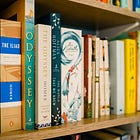Reading in Public No. 73: Trying to hack our reading is leading to stagnation
On submitting our reading to algorithms of our own making
Last month I picked up a 200ish page mystery from the 1950s called The Daughter of Time by Josephine Tey. I can’t quite recall how this book ended up on my radar. I know it’s on some best mystery lists, but I don’t really look at those lists because if there’s one thing I know about myself as a reader, it’s that I don’t enjoy mysteries. Nevertheless, this book continued to beckon to me until I picked it up a couple weeks ago and absolutely loved it. Is The Daughter of Time the best book I read last month? No. It’s not even my favorite. But it is the book that gave me the most delight, the one I stayed up late to finish, and the one I keep bringing up in conversation whenever it’s remotely relevant.
As soon as I finished I started thinking about what it is about this mystery that kept me enraptured when I find most books in this genre to be a total slog. After some thought, I determined that I really enjoy a mystery that must be solved through research rather than clue finding, and that a mystery from the past is more compelling to me than one that must be solved with urgency. Armed with this discover, I promptly asked for recommendations from my reader friends and started Googling to find readalikes in the same vein.
But I think I learned the wrong lesson from my delightful midcentury mystery. This is not to say that I don’t enjoy research-based mysteries—I think I’ve hit on something true there. But the greater lesson of this experience should not be how to hack my own mystery reading; it’s that the element of surprise and discovery is what often makes for the most fulfilling reads.
This mental course correction happened as I was listening to Atlantic culture critic Spencer Kornhaber interviewed by Derek Thompson about the decline of pop culture. While I disagreed with some of the finer points in their discussion, the topic overall is fascinating to me, and I found both the podcast and Kornhaber’s article (gift link) very worthwhile. Neither piece really gets into the world of books, but as someone whose job description might be most easily summarized as “professional book recommender,” it was easy to extrapolate into the literary realm. In particular, I found their discussion of the popularity of first-person, confessional pop songs to relate so well to my ongoing thoughts on first-person fiction. But that’s a topic for another day…
Kornhaber’s first point in both the article and his conversation with Thompson is that culture has stagnated, meaning consumers of culture are reluctant to try anything new. This can take a lot of forms: rewatching and relistening to favorite shows and music (guilty!), consuming older pop culture that’s tried and true, and just generally seeking out more of the same when it comes to what we like. We have become less willing to experiment with lesser known pop culture because we are less willing to tolerate things we don’t like very much, and—because of that—we are settling for things that are just fine. At work here are the algorithms that suggest or straight up serve us art and entertainment that is sure to be a win because it resembles things we already enjoy.
At first I thought this part of the conversation didn’t apply so easily to books. The new and shiny still seems to be what dominates the bookish landscape from my purview. Here on Substack, the return to classics feels countercultural in many ways. But looking at the New York Times Best Sellers list tells another story. It’s filled with familiar author names and books from popular series. Even the new releases have a whiff of stagnation about them. When the buzziest book events of the year have been a new installment in the Hunger Games series1 and a new Emily Henry novel, it’s difficult to argue that readers are seeking novelty in their books.
As for the algorithms that ensure we never listen to a song we dislike and are constantly presented with queues of shows to our taste, that level of flat-lined culture has yet to enter the literary sphere in the same way. While Amazon and Goodreads make algorithm-based suggestions, readers certainly don’t rely on these tools to choose our next books. That doesn’t mean that algorithmic thinking isn’t impacting our reading. Certainly those of us who get book suggestions from social media are allowing algorithms to influence what we pick up as our feeds tend to bombard us with the books already popular enough to prove their worth keeping eyeballs on the platform. AI might mean technology becomes even more of a player in the realm of book recommending. I, as a human book recommender, feel a great deal of concern over that, especially as it becomes clearer that more bookish content creators are relying on this technology to aid in their work.
But I still think we readers have a lot of opportunity for spontaneity and discovery—much more so than we do in other areas of art and entertainment—which is why I am becoming increasingly antagonistic to the urge to hack our own reading. When I hear readers talk about their reading in terms of dissecting the exact tropes, prose styles, settings, topics, POVs, imprints, etc., that they like and do not like, it really reminds me of the algorithms that shape our consumption in other areas.
Of course, I’m guilty of this kind of thinking myself. I’m on the record saying I hate books with too many similes and that I can’t stand first person present narration. As stated above, I am not a mystery reader but once I found a mystery I liked, I was eager to hack my way to a replicable experience. But with any of these known dislikes, there is always the exception that breaks the rule. Thankfully, my recommendations are not curated by an algorithm that is weeding out everything I profess to dislike! But we can be guilty of doing this very thing to ourselves by trying to gather and make decisions based on too much detailed data.
This is not to say I don’t enjoy thinking about taste, because I actually think it’s one of my favorite things to things to ponder. I have enjoyed discerning my own taste as I’ve exited academia and started reading more broadly. I also love knowing my reader friends’ tastes and being able to confidently recommend books to them based on that knowledge. I would never discourage anyone from thinking deeply about their own literary preferences—that kind of metacognition is profoundly fruitful. But when we attempt to use this self knowledge to hack a “better” reading life, we may start to submit to a sort of algorithm of our own making.
So…is there anything wrong with only wanting to read books you like?
Well, yes and no. Of course it isn’t wrong to want to find books we love. Time is finite, and unlike a song (3ish minutes) or even a movie (2ish hours), books take considerable time, attention, and effort to consume. I get that the idea of spending 12 hours reading a book we don’t like feels like a waste when there is so much out there to read. But I also know that picking up a book that I already know checks all of my boxes is never particularly satisfying, even when I thoroughly enjoy it. “I knew I would love this and I did,” just isn’t as thrilling as “I had no idea what to expect and I was delighted.”
And so as much as I enjoy considering taste, I think we are robbing ourselves by trying to pinpoint exactly what we like in our books. There isn’t yet an algorithm that has cracked books the way Spotify has cracked music. And we should be thankful for this. We still have the opportunity for discovery and an ease of experimentation. We don’t have to be served book after book that fits our specific taste, unless we go seeking that out.
Is there room for both self-knowledge and surprising discoveries? Of course. But in order to make sure there’s room for both, we need to let go of the idea that a good reading life is one in which we like every book we read. Maybe the waste is not reading a book we don’t like, but reading the same types of things over and over. Because by trying to ensure we only read books we like, we might be stagnating our reading and costing ourselves the surprises that make the literary life so very satisfying.
Tell me your thoughts! Do you find yourselves drawn to the same surefire hits in your reading life? What was the last book that totally surprised you—for better or worse?
If you enjoyed this piece, you may also like:
For questions, comments, or suggestions, please don’t hesitate to reach out by emailing fictionmattersbooks@gmail.com or responding directly to this newsletter. I love hearing from you!
This email may contain affiliate links. If you make a purchase through the links above, I may earn a small commission at no additional cost to you.
If you enjoyed today’s newsletter, please forward it to a book-loving friend. That’s a great way to spread bookish cheer and support the newsletter!
Happy reading!
Sara
Which I am admittedly, extremely excited to read.








I find that I depend more and more on people like you to recommend books that are outside my comfort zone. I never thought of the comparison to algorithms in the series after series of books that seem like the same book with a different title. Thank you and keep up the good work.
I love surprise in my reading and I've tried to take steps this year to add more surprise to my reading life.
I do have a thought about this: "we need to let go of the idea that a good reading life is one in which we like every book we read." I love this statement, but would like to tweak it a bit for myself. For me, I'd like it to be "we need to let go of the idea that a good reading life is one in which we like every book we TRY." I love the idea of being open to trying books that may not, on the surface, check all your reading boxes, but having the freedom to quit them if they aren't working. Two personal examples of books I tried even though I didn't think they'd work for me are Tomorrow x3 and Demon Copperhead...and I LOVED both.
On the flip side, I tried Aftertaste by Daria Lavelle this year despite it having ghosts and magical realism (2 things that don't generally work for me) and didn't like it once I got into it, so I was thrilled to have the freedom to put it down.